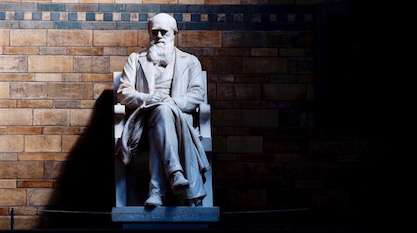 Evolution
Evolution
Skepticism About Darwinian Evolution Grows as 1,000+ Scientists Share Their Doubts

 Photo: Darwin’s statue, Natural History Museum, by http://www.cgpgrey.com [CC BY 2.0], via Wikimedia Commons.
Photo: Darwin’s statue, Natural History Museum, by http://www.cgpgrey.com [CC BY 2.0], via Wikimedia Commons.Over 1,000 doctoral scientists from around the world have signed a statement publicly expressing their skepticism about the contemporary theory of Darwinian evolution. The statement, located online at dissentfromdarwin.org, reads: “We are skeptical of claims for the ability of random mutation and natural selection to account for the complexity of life. Careful examination of the evidence for Darwinian theory should be encouraged.”
“Because no scientist can show how Darwin’s mechanism can produce the complexity of life, every scientist should be skeptical,” said biologist Douglas Axe, director of Biologic Institute. “The fact that most won’t admit to this exposes the unhealthy effect of peer pressure on scientific discourse.”
False Statements About Darwinian Evolution
Discovery Institute first published its Scientific Dissent from Darwinism list in in The New York Review of Books in 2001 to challenge false statements about Darwinian evolution made in PBS’s series Evolution. Promoters of the series, among others, claimed that “virtually every scientist in the world believes the theory to be true.”
Bruce Chapman, Discovery Institute’s Chairman of the Board, found 100 PhD scientists to sign the initial dissent statement. Realizing that there were likely more scientists worldwide who shared some skepticism of Darwinian evolution and were willing to go on record, the Institute has maintained the list and added to it continually since its inception.
The list of signatories now includes 15 scientists from the National Academies of Science in countries including Russia, Czech Republic, Brazil, and the United States, as well as from the Royal Society. Many of the signers are professors or researchers at major universities and international research institutions such as the University of Cambridge, London’s Natural History Museum, Moscow State University, Hong Kong University, University of Stellenbosch in South Africa, Institut de Paléontologie Humaine in France, Ben-Gurion University in Israel, MIT, the Smithsonian, Yale, and Princeton.
“As a biochemist I became skeptical about Darwinism when I was confronted with the extreme intricacy of the genetic code and its many most intelligent strategies to code, decode, and protect its information,” said Dr. Marcos Eberlin, founder of the Thomson Mass Spectrometry Laboratory, and a member of the National Academy of Sciences in Brazil.
